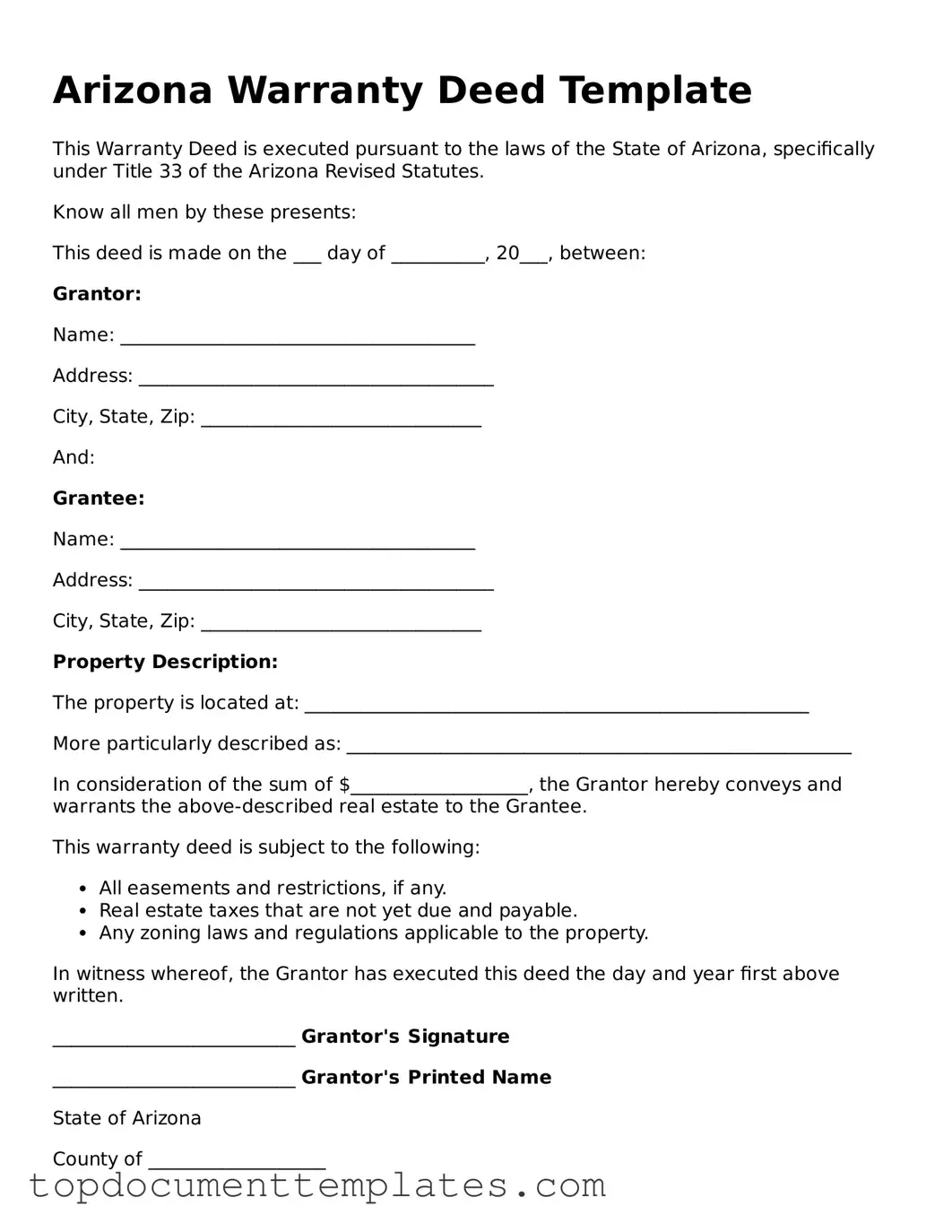Valid Deed Form for Arizona State
The Arizona Deed form is a crucial document in real estate transactions, serving as a legal instrument to transfer property ownership from one party to another. This form typically includes essential details such as the names of the grantor (the person transferring the property) and the grantee (the person receiving the property), as well as a clear description of the property being conveyed. The deed must be signed by the grantor and often requires notarization to ensure its validity. In Arizona, different types of deeds exist, including warranty deeds and quitclaim deeds, each serving specific purposes and offering varying levels of protection to the grantee. Additionally, the form must comply with state regulations to be considered legally binding. Understanding the components and requirements of the Arizona Deed form is vital for anyone involved in property transactions, as it lays the foundation for the transfer of real estate rights and responsibilities.
Similar forms
The Deed form is similar to several other legal documents. Each serves a specific purpose in property transactions or legal agreements. Here are eight documents that share similarities with the Deed form:
- Title: The title document proves ownership of property. Like a deed, it establishes who holds legal rights to the property.
- Bill of Sale: This document transfers ownership of personal property. It is similar to a deed in that it formalizes the transfer process.
- Lease Agreement: A lease outlines the terms under which one party rents property from another. Both documents establish rights and responsibilities between parties.
- Mortgage Agreement: This document secures a loan with property as collateral. It operates similarly to a deed by detailing ownership and obligations.
- Durable Power of Attorney: This crucial document not only empowers an individual to make decisions on behalf of another but also remains effective even in cases of incapacity. It's essential for ensuring that personal wishes are respected and can be further understood through resources like onlinelawdocs.com/.
- Quitclaim Deed: This deed transfers interest in a property without guaranteeing the title. It is a simpler form of a deed, often used between family members.
- Trust Agreement: A trust outlines how property is managed and distributed. It can involve deeds when transferring property into the trust.
- Power of Attorney: This document allows someone to act on behalf of another in legal matters. It can relate to deeds when transferring property rights.
- Warranty Deed: This type of deed guarantees that the seller holds clear title to the property. It provides more protection than a quitclaim deed, but both serve to transfer property ownership.
Guidelines on Writing Arizona Deed
After completing the Arizona Deed form, you will need to submit it to the appropriate county recorder's office. This step is crucial for ensuring that the transfer of property ownership is legally recognized. Below are the steps to fill out the form correctly.
- Begin by entering the date at the top of the form.
- Identify the grantor (the person transferring the property). Fill in their full name and address.
- Next, provide the name and address of the grantee (the person receiving the property).
- Describe the property being transferred. Include the legal description, which may be found in previous deeds or property tax records.
- State the consideration, which is the amount of money or value exchanged for the property. This may be a nominal amount if the transfer is a gift.
- Include any additional terms or conditions of the transfer, if applicable.
- Both the grantor and grantee must sign and date the form. Ensure that the signatures are notarized, as this is often a requirement.
- Finally, make copies of the completed deed for your records before submission.
File Information
| Fact Name | Description |
|---|---|
| Definition | The Arizona Deed form is a legal document used to transfer ownership of real property in Arizona. |
| Types of Deeds | Common types include warranty deeds, quitclaim deeds, and special warranty deeds. |
| Governing Laws | The Arizona Revised Statutes, particularly Title 33, govern property transfers and deed forms. |
| Notarization Requirement | All deeds must be notarized to be legally effective in Arizona. |
| Recording | Deeds should be recorded with the county recorder's office to provide public notice of ownership. |
| Consideration | A deed must state the consideration, or payment, involved in the transfer of property. |
| Grantee and Grantor | The deed must clearly identify both the grantor (seller) and the grantee (buyer). |
| Legal Description | A precise legal description of the property being transferred is required on the deed. |
| Tax Implications | Property transfers may have tax implications, such as transfer taxes or property taxes. |
Other Popular Deed State Forms
Texas Deed Form - It must be signed by the grantor to be effective, establishing a formal transfer of rights.
A Last Will and Testament is a legal document that outlines your wishes for how your assets should be distributed after your death. It also allows you to appoint guardians for any minor children and to designate an executor to manage your estate. Understanding this form is crucial for ensuring that your desires are fulfilled and your loved ones are taken care of. For more information, you can refer to the form available at https://documentonline.org/blank-last-will-and-testament/.
Michigan House Deed - Can provide a timeline for property development.
